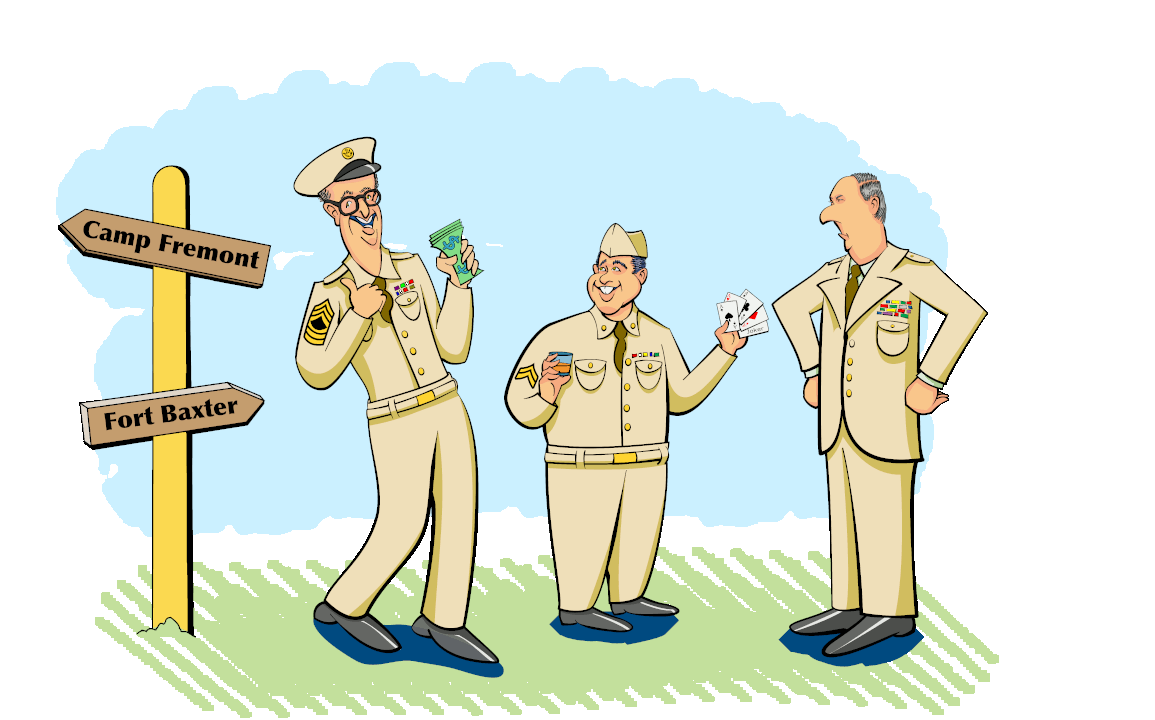During the 1950's and early 60's, Sergeant Bilko was a household name for Americans of culture.
Americans of
 POPULAR
POPULAR
CULTURE
... that is.
Programs about life in the army became staples in the early decades of commercial television. Many of these shows were about the late war - The Gallant Men, Combat!, Broadside, Twelve O'Clock High, Convoy, The Underground Front, and The Rat Patrol.1 The series were often serious action-adventure shows although some were comedies like McHale's Navy, Mister Roberts, The Wackiest Ship in the Army, and Hogan's Heroes.
Footnote
The Rat Patrol was about Allied soldiers in North Africa fighting against the German army commanded by Field Marshal Erwin Rommel. They fought Rommel's forces using machine guns mounted on the back of jeeps. This was accurate as far as it went in that such vehicles were employed to fight against the Germans in the Desert Campaign. One veteran, though, who actually employed such armament said that you really couldn't fight tanks with machine guns mounted in the back of a jeep. "Not successfully," he added.
You'll Never Get Rich, though, was not a war show. Later redubbed The Phil Silvers Show, the program was about life on an Army post in Kansas during the 1950's where the head of the motor pool was Master Sergeant Ernest G. Bilko. When the series premiered on September 20, 1955, Sgt. Bilko was referred to as a Damon Runyanish character. For the many who are too young to recognize the reference, Damon Runyan was an early American writer whose characters were gamblers, grifters, swindlers, and hucksters.
According to a contemporary account - whose accuracy isn't quite determined - Phil's early years in show business were rather bumpy. Phil was born in New York City (where else?) in 1911. He got into performing by imitating the singing of various celebrities at age 14 at Coney Island. This phase of his career came to an end when he lost his voice and he began to act in "brat" roles in vaudeville plays. This career phase also came to an end when he got too old and too big for the parts. But his personality made him a natural comedian on what was called the "burlesque" circuit and in a few years he was one of America's top comics.
Just like no one ever said they watched The Tonight Show with Johnny Carson but instead just said they watched Johnny Carson, people didn't watch You'll Never Get Rich or The Phil Silver's Show. They watched Sergeant Bilko. Every week the wily Sergeant would put together some scheme to supplement his non-com's $300 per month pay. Many of Sgt. Bilko's - ah - "projects" - were done under the nose of the fort's commanding officer, Colonel John Hall, blusteringly played by Paul Ford.
Bilko's plans often involved setting up what are now politely called "games of chance" and among his partners were Corporals Rocco Barbella (Harvey Lembeck) and Steve Henshaw (Allan Melvin). The schemes never seemed to quite come off but Sgt. Bilko kept on trying for four seasons. This was a quite respectable run for such an early series when shows lasting only a year were common.
In the last two seasons, the battalion was transferred to Camp Fremont in California where their caperings continued. Although not exactly fictitious, the reference is a bit anachronistic. The real Camp Fremont was a short lived fort and was only active during World War I. It was established in 1917 and closed down in 1919.
Believe it or not, Bilko is a bonafide surname and not just a made up moniker and play on the word "bilk" meaning "to get money form someone dishonestly or unfairly". The name is of Polish and Russian origin and in Polish the word "bilko" means "rod" or "stick". The name seems to have arisen in the 15th Century around the town of Bialystok which today is the largest city in northeastern Poland and the capital of Podlaskie province. On the other hand, in the United States the name is not particularly common and only 141 people proudly bore the name in the 2010 Census.
Like all prime time series Sgt. Bilko (as we'll continue to call it) was peppered with famous or soon-to-be famous guest stars. These included Mike Todd (famed producer and third husband of Elizabeth Taylor), comedian Tom Poston, Sydney Smith, Arthur Cohen, Dina Merrill, character actor Ford Rainey, Charles Cooper, Gary Crosby (son of Bing), Dennis Crosby (son of Bing), Phillip Crosby (son of Bing), Bing Crosby (father of Gary, Dennis, and Phillip), crooner and capable actor Dean Martin, the ever cheerful Peggy Cass, future center of the Hollywood Squares Paul Lynde, Christopher Lloyd (yes), George Kennedy, Mickey Rooney, Lee Meriwether, Margaret Hamilton (Oz's Wicked Witch of the West), Ed Sullivan (taking a break from his really big shew), Sydney Chaplin (son of Charlie), Fred Gwynne (Car 54's Patrolman Francis Muldoon and Herman Munster on The Munsters), William Bramley (Officer Krupke in the film West Side Story), Natalie Schafer (Mrs. "Luvie" Howell from Gilligan's Island), Erik Rhodes, Julie Newmar (Catwoman on TV's Batman), Efrem Zimbalist Jr. (PI Stu Bailey on 77 Sunset Strip and FBI Inspector Lewis Erskine on The FBI), Robert Morse (J. Pierrepont Finch in How to Succeed in Business Without Really Trying), Yankee pitching ace Whitey Ford, The McGuire Sisters Phyllis, Christine, and Dorothy, McGuire, Alan Alda (Hawkeye Pierce from TV's MASH), Tina Louise (Ginger on Gilligan's Island), Dick Van Dyke (Rob Petrie on The Dick Van Dyke Show), golfing great Sam Snead, Morey Amsterdam (comedy Buddy Sorrell in The Dick Van Dyke Show), Zippy the Chimp (who was accidentally admitted into the ranks in one of the more amusing shows), Yankee shortstop and announcer Phil Rizzuto, golfer Claude Harmon, Lucille Ball (yes, Lucy), Alexander Scourby, song writer Sammy Cahn, blonde bomshell Dagmar (real name Virginia "Jennie" Lewis), future talk show host Dick Cavett, New York Yankee legend Yogi Berra, character actor Jack Albertson (Ed Brown of Chico and the Man, comedian and actor Godfrey Cambridge, and comedian Orson Bean.
Sgt. Bilko was notable in that there were black soldiers. Reportedly Phil refused to do the show unless it realistically portrayed an integrated army.
And of course like other hit TV shows from the 50's and 60's, there was a movie revival some decades later. Seargent Bilko was released in 1996 and like most movie revivals of a classic, it was neither financially or critically successful.
After Sgt. Bilko went off the air, Phil did not lack for work. Although he did have a series The New Phil Silvers Show in 1965, it lasted only one season. However, he did appear in a number of guest slots like Gilligan's Island, The Lucy Show, The Beverly Hillbillies, Rowan and Martin's Laugh-In, The Dean Martin Show, The Carol Burnett Show, Charlie's Angels, The Love Boat, and Fantasy Island ("The plane! The plane!"). Naturally he had live shows in clubs and theaters including appearances in Las Vegas.
Although Phil's fame is mostly as a television comedian, he had been appearing in movies since the 1930's. Probably his most famous films were It's a Mad, Mad, Mad, Mad World (1963) and A Funny Thing Happened On the Way to the Forum (1966). His last film was in 1980 with the rather strange There Goes the Bride where the lead role of a father whose daughter was about to get married was none other than (what one critic called badly miscast) Tom Smothers. Other cameo roles went to the then well-known celebrities like Martin Balsam, Jim Backus, Broderick Crawford, Pedro Gonzalez Gonzalez, Steve Franken, Carmen Zapata, and Lesley Lawson better known as Twiggy. Phil played a psychiatrist whose client is telling him the story. Like the Sgt. Bilko movie revival, this film has not been deemed widely successful.
References and Further Reading
"Frequently Occurring Surnames from the 2010 Census", United States Census Bureau.
"Louis G. Cowan and his $64,000 Question", Leon Gutterman, The Southern Jewish Weekly, September 16, 1955, p. 144.
"Today's TV Highlights", [Washington D. C.] Evening Star, September 20, 1955, p. 22.
"My Life With 'Bilko' - A Daughter's Memories", The Jewish Chronicle
."Bias Charges Against the Phil Silvers Show Unfounded", Arizona Sun, March 22, 1956, p, 8.
"Historical Military Pay Charts from 1949 to 2024", Federal Pay.
"Bilko", Name Census.
